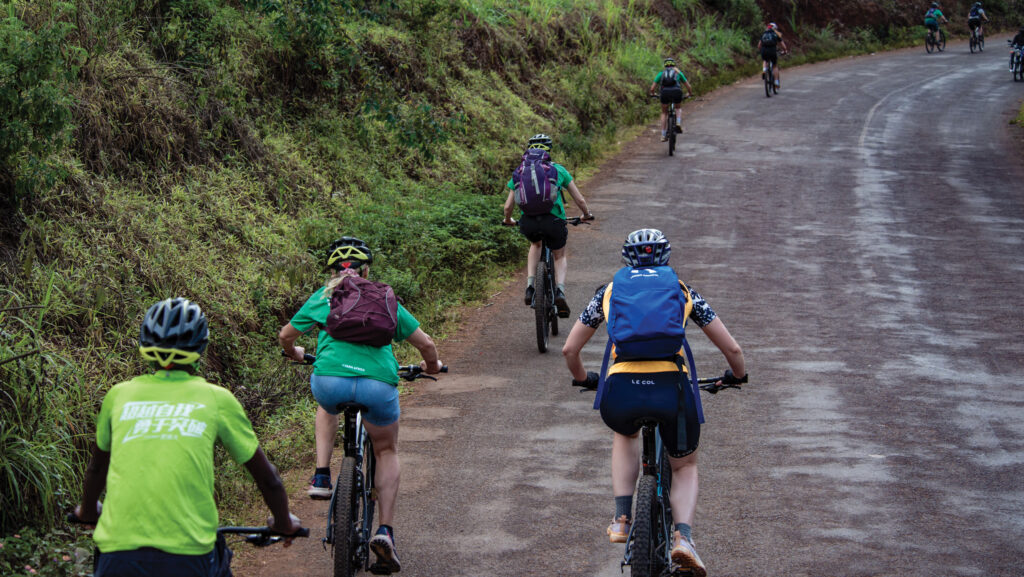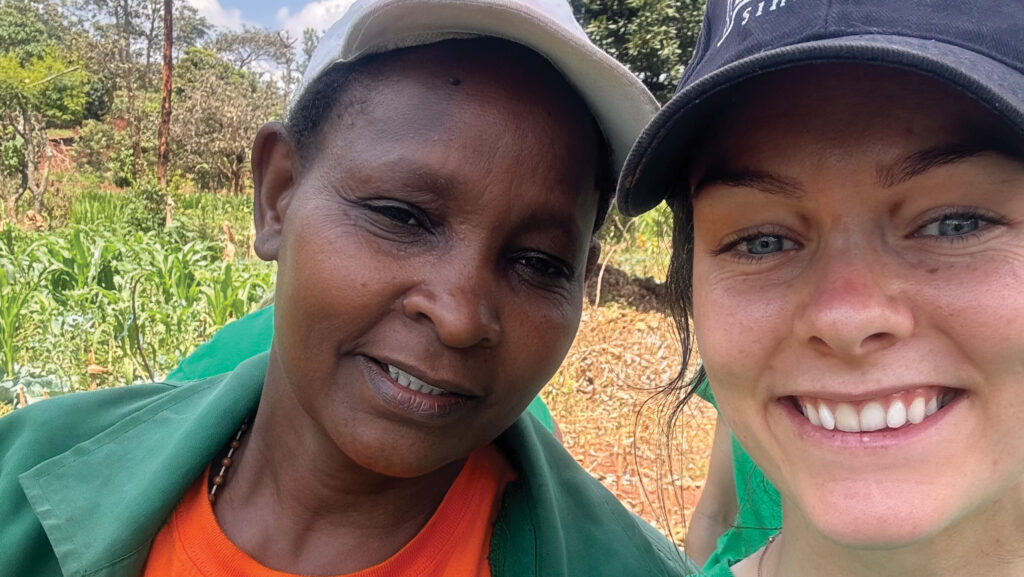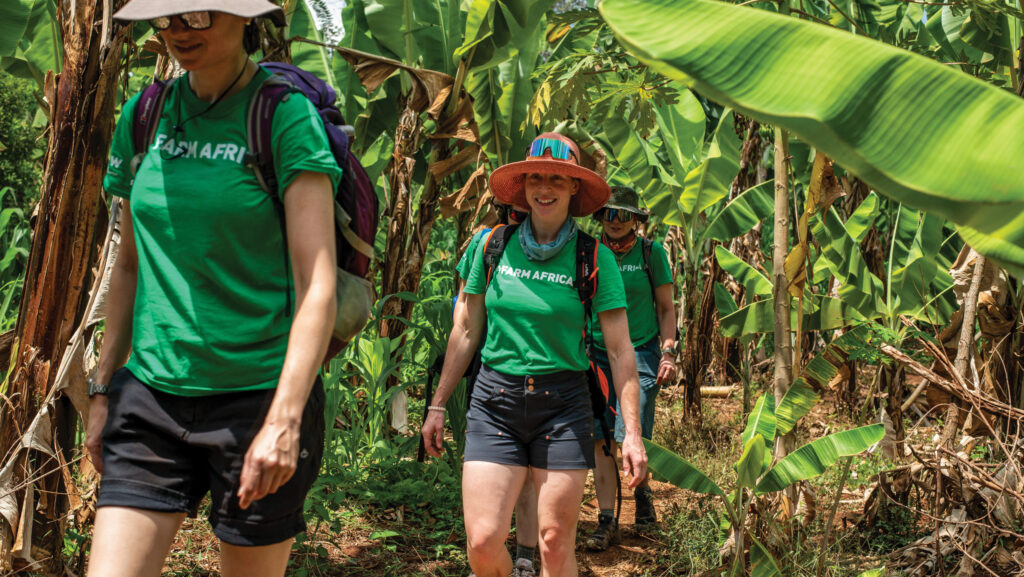Broadening horizons: Connecting with Kenya’s female farmers
 © Farm Africa
© Farm Africa In October, a group of 12 women including members of the UK farming community embarked on an unforgettable adventure through Kenya’s vibrant countryside.
Cycling 75km over five days, they met with local female farmers, exchanging wisdom on regenerative agriculture while raising vital funds for the Grow for Good Challenge.
See also: Farm Africa – a charity worth running for
The challenge was organised by Farm Africa, a charity founded in 1985 with a focus on improving the lives of smallholder farmers across the region.
So far, the women have raised more than £50,000 through their efforts, money that will help provide resources, training, and support for female Kenyan farmers as they tackle the effects of climate change.
Among the participants were Helen Newbrook and Caroline Mason, two women passionate about supporting agricultural communities.

© Farm Africa
Helen’s journey: Learning, empowerment and sustainability
Helen is an expert in strategic business advice, ensuring that UK farmers can access essential grants and guidance, including Defra’s Future Farming Resilience Fund.
Her journey to Africa was more than just a chance to travel – it was an experience that opened her eyes to the power of farming practises and the resilience of women farmers, a transformative encounter that would forever change her view of farming.
Growing up on her family’s dairy, beef and sheep farm in North Wales, studying at Harper Adams University, and working as a farm consultant, Helen has always been deeply involved in farm life.
The trip’s focus on female farmers was especially empowering for Helen, who saw this as a chance to learn directly from women in Africa who, like herself, are at the forefront of agricultural work.
“It was inspiring to see so many women share the same passion for agriculture, even though we came from such different backgrounds,” she says.
“It was a beautiful reminder of the strength that comes from collaboration.”
The smiles of children running alongside the cyclists were infectious, and the sense of community that permeated every village she visited left a lasting impression.
Young people
A particularly memorable discussion for Helen centred on the issue of young people leaving farming for better opportunities in urban areas — a challenge that resonates with farmers everywhere.
The women spoke together about providing young farmers with the tools, knowledge, and financing they need to succeed.
They also discussed changing the public perception of farming as a viable, profitable career.
The trip also introduced Helen to several farming techniques that she found fascinating, particularly those focused on sustainability.
“I was amazed by how simple, yet effective, some of the practices were,” she says.
She learned about minimum tillage and intercropping, methods that enhance soil health, and help farmers in Africa adapt to climate change.
The technique that stood out to her, however, was composting with livestock manure and plant waste. “These practices are not just cost-effective; they’re environmentally friendly too,” Helen says.
“They showed me how much can be achieved with limited resources and how sustainable farming can be achieved within even the most challenging environments.”
Home plans
Back home, Helen is eager to implement some of these practices on her own farm.
“I’m particularly excited about trying wormeries in my kitchen garden,” she says. “It’s a fantastic way to recycle kitchen waste and turn it into nutrient-rich compost.”
Helen’s journey also highlighted the importance of cross-cultural collaboration and support for female farmers.
“When women in agriculture connect, it creates a powerful support network,” she says.
“By sharing knowledge and experiences, we can help each other tackle the challenges we face, whether climate change, market access, or financial support.”

Caroline Mason © Farm Africa
Caroline’s journey: Climate and connection
Caroline has worked in the food and farming sector for more than 15 years and saw the Grow for Good Challenge as a unique opportunity to deepen the connection between UK farmers and their counterparts in Kenya.
For Caroline, the 75km bike ride across the rugged roads of Embu County wasn’t just a physical challenge; it was an opportunity to connect with resilient women farmers in East Africa, share knowledge, and experience regenerative farming up close.
Raised on a beef farm in Shropshire, nature and farming have always been close to Caroline’s heart. With more than two decades of experience in global food systems, she was thrilled to witness how women in Kenya transform agriculture in the face of adversity.
“I’ve always been captivated by food and farming,” she says. “Understanding how farming systems work worldwide is what excited me the most.”
Commitment
On the farms the group visited, Caroline was inspired by the women’s unwavering commitment to regenerative farming methods.
The simplicity of the farming methods she saw was humbling. “Everything is done by hand with basic tools — grit, sweat, and muscle,” Caroline says.
Yet, despite the lack of resources, Caroline found the Kenyan farmers’ ingenuity astonishing.
She witnessed first-hand how techniques such as mulching and composting are used to combat climate change and improve crop yields, with women defying the odds to maintain their livelihoods despite unequal access to land, finance, and seeds.
“Soils rich in organic matter can withstand droughts and heavy rains, and in some cases, they can even double yields,” she says.
This experience reinforced her belief that farming techniques must be adaptable and innovative to meet the challenges posed by the changing climate.
Let’s dance
One of her most cherished memories came after a long day spent learning and working together when the local women invited the group to dance.
“There’s no cultural barrier to dancing,” Caroline says. “It was a beautiful moment of pure connection where no words were needed. It was a celebration of our shared experiences and learning from each other.”
But perhaps the most profound takeaway for Caroline was the importance of female farmers in both the UK and Kenya.
“Women are the backbone of agriculture,” she says. “We have so much in common, and we need to help them thrive. Their contributions are transformative, not just essential.”
Throughout her trip, Caroline was reminded of the power of collaboration and support. “Women supporting other women is crucial,” she says.
“We all want to provide nutritious, healthy food for our families, and we want to do it in a way that is kind to the planet.”
The future
Looking ahead, Caroline is determined to continue her work bridging the gap between climate, nature, and farming.
“My goal is to help create thriving ecosystems where communities have access to healthy, affordable food year-round,” she says.

